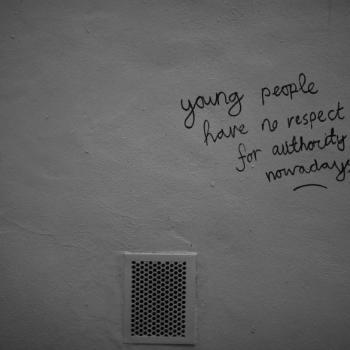You have heard that it was said, 'Love your neighbor and hate your enemy.' But I tell you: Love your enemies and pray for those who persecute you, that you may be sons of your Father in heaven. He causes his sun to rise on the evil and the good, and sends rain on the righteous and the unrighteous. If you love those who love you, what reward will you get? Are not even the tax collectors doing that? And if you greet only your brothers, what are you doing more than others? Do not even pagans do that? Be perfect, therefore, as your heavenly Father is perfect.
This really is the heart of the matter. While the sermon has many practical issues we can learn from with regard to how we as Christians can do our part to build a culture of trust in our workplaces, the first step begins at the heart. Just as our Father in heaven works to bless the evil and the good, we can go into our workplaces -- places full of deception, manipulation, competition, slander, gossip (and a host of other trust-destroying behaviors) -- and be agents of trust-building. But in order to begin, we must get our hearts right. We must cultivate not only an awareness of others and their needs (with our best emotional intelligence skills), but also a heart that desires to serve others -- even our enemies.
This means seeing our jobs and, indeed, the entire workplace, as a field for service.
With regard to our co-workers, we can serve others in a myriad of ways -- working collaboratively with colleagues to accomplish objectives, helping subordinates grow and develop their potential, giving constructive feedback to a co-worker, showing respect to a boss by getting a tough project done on time and within the budget. As a company or organization, we can also play a part to serve our customers. The products or services that your company or organization produces meet the needs of your customers.
A former CEO of a large energy company writes about how he would sometimes affirm people in this respect, like going up to a grocery store restocking employee and thanking him for providing a service that allows him and others to buy the food they need to live. I am not afraid, as an evangelical, to quote John Paul II as I conclude, because I think his words help to give a great perspective, demonstrating that our workplace is not just a place to "make a living" so that we can serve others elsewhere. It is a very important place of service in its own right:
The purpose of a business firm is not simply to make a profit, but is to be found in its very existence as a community of persons who in various ways are endeavoring to satisfy their basic needs and who form a particular group at the service of the whole society. Profit is a regulator of the life of a business, but it is not the only one; other human and moral factors must also be considered, which in the long term are at least equally important for the life of a business (as quoted in Michael Novak's, Business as a Calling, 138).
William Miller earned his bachelor's degree at Brown University and his Ph.D. in history at the University of Dallas. He has worked as the campus director of Campus Crusade for Christ's chapter at Stanford University, and as the head writer of employee-development materials for Premiere Global Services. He currently lives and teaches in Prague with his wife and two sons.
This appears as a part of the Faith@Work Consultation. See also:
Peter Collins, The Ethics of Firing, Part 1 and Part 2.
Galen C. Dalrymple, The Curse of Busyness, What Are You Building?,
Timothy Dalrymple, The Holy Ghost in the Machine, and first and second articles on the Moral Dimensions of the Financial Crisis.
Mary DeMuth, Marketing Without Manipulation.
Jonathan Dodson, Do Worldly Honors Matter?.




